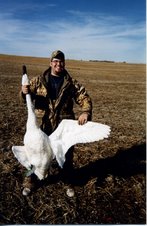
It seems as though every Minnesota fishing opener I can remember it rains. Sunday is always a nice sunny day but on Saturday it is always miserable. I don’t know what the exact odds of it raining on fishing opener are, however that time of year I imagine it is close to fifty percent.
When participating in any activity that is performed outdoors it is important to have a grasp on the current weather. This is especially true when hunting and fishing. Not only does one need to be prepared for the elements by dressing properly; fish and animal movements are often influenced by the weather.
Barnie Calef once told me that ‘winter storm warning’ are a waterfowl hunters three favorite words. It doesn’t matter if you are hunting ducks and geese in Minnesota or the Dakotas. When birds are on the move, due to dropping temps and freezing water, hunting is good. The key to consistently having success hunting over decoys is hunting ‘fresh’ or new birds.
Another veteran of waterfowl hunting, Dean Tlougan, owner and operator of Premiere Flight guide service says that barometric pressure plays a role in the success of a goose hunt. Fishing tends to pick up when the barometric pressure falling as well, typically right before cold fronts or storms. I cannot confirm or deny that barometric plays a role with decoying birds.
Many people claim they can feel pressure and weather changes in their joints and can accurately predict changing weather. Due to a high school football leg injury, I can typically tell if the weather is going to change through pain in my ankle. Listening, watching or reading weather forecasts through any media is just another way to insure a safe and enjoyable time in the outdoors. However, similar to the weather, game and fish do not always cooperate.
A few short years ago my friends and I would hunt geese in Canada from a remote farmhouse, which we rented. With little or no cell reception, no television or radio it was hard to get an accurate weather forecast. Lucky for us, my buddy J.D. would have his girlfriend call him at the farmhouse every night at nine.
From her apartment she would look up the forecast online and give J.D. a current and accurate forecast for Saskatchewan. With the forecast being critical for preparation, her phone calls were a lifesaver. J.D. would get everything from the temperature to wind direction and speed. Which would save us precious time in the morning figuring how we were going to set decoys and blinds. When decoying snow geese, wind is a must.
Today J.D. has and iPhone and the farmhouse we rent surprisingly has upgraded with a wireless Internet connection. Now we can get current and accurate forecasts from J.D.’s phone. Don’t worry, J.D. still talks to his girlfriend while we are in Canada, just not as frequently or at a scheduled time.
As I have grown older time seems to be traveling by faster and faster. Living in the Midwest and getting to fully experience all four seasons gives one a sense of change and renewal. In autumn the changing of the leaves and the crackle of Canada geese urges hunters to seek sunrises. When lakes freeze fisherman want to fish through the ice and when it the lakes open in the spring we seek open water.
No two hunting and fishing seasons are the same. Year to year regulations can change with some predictability. Yet so much of our success as hunters and fisherman are pending approval from Mother Nature.

